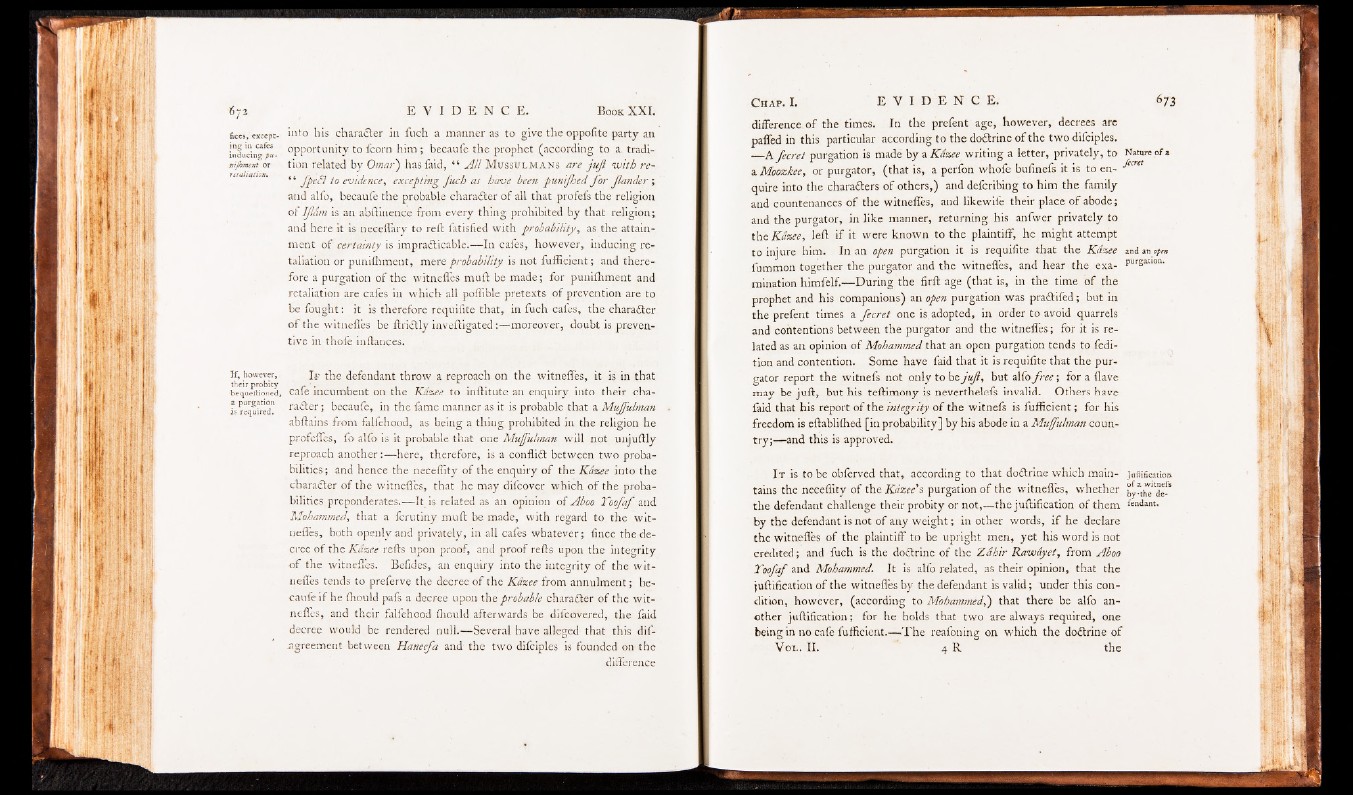
fices, excepting
in cafes
inducing pu-
nijbment or
retaliation.
I f, however,
their probity
bequeflionedj
a purgation
is required.
into his character in fuch a manner as to give the oppofite party an
opportunity to fcorn him ; becaufe the prophet (according to a. tradition
related by Omar) has faid, “ A ll M u s s u l m a n s are ju jl with re-
‘ ‘ fpeEl to evidence, excepting fuch as havp been punijhed fo r fa n d er;
and alfo, becaufe the probable charadter of all that profefs the religion
of I f dm is an abftinence from every thing prohibited by that religion;
and here it is neceflary to reft fatisfied with probability, as the attainment
of certainty is impracticable;— In cafes, however, inducing retaliation
or punifhment, mere probability is not fufficient; and therefore
a purgation of the witnefi'es muft be made; for punifhment and
retaliation are cafes in which all poflible pretexts of prevention are to
be fought: it is therefore requifite that, in fuch cafes, the charadter
of the witnefles be ftridtly inveftigated:—moreover, doubt is preventive
in thofe inftances.
I f the defendant throw a reproach on the witnefles, it is in that;
cafe incumbent on the Kdzee to inftitute an enquiry into their charadter;
becaufe, in the fame manner as it is probable that a Mujfulman
abftains from falfeho.od, as being a thing prohibited in the religion he
profefles, fo alfo is it probable that one Mujfulman will not unjuftly
reproach another:— here, therefore, is a conflict between two probabilities
; and hence the neceflity of the enquiry of the Kdzee into the
charadter of the witnefles, that he may difeover which of the probabilities,
preponderates.— It is related as an opinion of Aboo Toofcf and
Mohammed, that a ferutiny muft be made, with regard to the witnefles,
both openly and privately, in all cafes whatever; fince the decree
of the Kdzee refts upon proof, and proof refts upon the integrity
-of the witnefles. Belides, an enquiry into the integrity of the witnefles
tends to preferve the decree of the Kdzee from annulment; becaufe
if he fhould pafs a decree upon the probable charadter of the witnefles,
and their falfehood fhould afterwards be difeovered, the faid
decree would be rendered null.— Several have alleged that this dif-
iigreement between Haneefa and the two difciples is founded on-the
difference
difference, of the times. In the prefent age, however, decrees are
pafled in this particular according to the dodtrine o f the two difciples.
— A fecret purgation is made by a Kdzee writing a letter, privately, to Nature o f a
a.Moozkee, or purgator, (that is, a perfon whofe bufinefs it is to en- :re‘
quire into the characters of others,) and deferibing to him the family
and countenances of the witnefles, and likewife their place of abode;
and the purgator, in like manner, returning his anfwer privately to
the Kdzee, left if it were known to the plaintiff, he might attempt
to injure him. In an open purgation it is requifite that the Kdzee and an opm
fummon together the purgator and the witnefles, and hear the exa- ErurSatl0n-
mination himfelf.— During the firft age (that is, in the time o f the
prophet and his companions) an open purgation was pradtifed; but in
the prefent times a fecret one is. adopted, in order to avoid quarrels
and contentions between the purgator and the witnefles; for it is related
as an opinion of Mohammed that an open purgation tends to fedi-
tion and contention. Some have faid that it is requifite that the purgator
report the witnefs not only to be ju jl, but alfo fr e e ; for a flave
may be juft, but his teftimony is neverthelefs invalid. Others have
faid that his report of the integrity of the witnefs is fufficient; for his
freedom is eftablifhed [in probability] by his abode in a Mujfulman Country;—
and this is approved.
I t is to be obferved that, according to that dodtrine which main- juftification
tains the neceflity of the Kdzee’ s purgation of the witnefles, whether, de?
the defendant challenge their probity or not,— the juftification of them fenllant'
by the defendant is not of any weight ; in other words, if he declare
the witnefles of the plaintiff to be upright men, yet his word is not
credited ; and fuch is the dodtrine of the Zdhir Rawdyet, from Aboo
Toofaf and Mohammed. It is alfo related, as their opinion, that the
juftification of the witnefles by the defendant is valid ; under this condition,
however, (according to Mohammed,) that there be alfo another
juftification; for he holds that two are always required, one
being in no cafe fufficient.— The reafoning on which the dodtrine of
V ol. II. ' 4 R the